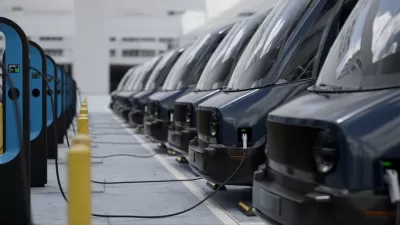The agency claims the federal government isn't providing enough funding to switch more of its delivery trucks to electric vehicles.

The U.S. Postal Service is blaming a lack of funding for its recent decision to prioritize gas-powered vehicles in its purchasing plans, reports Mack Degeurin for Gizmodo. The decision garnered backlash from environmentalists and electrification advocates who say committing to only 10 percent electric vehicles in one of the world's largest government fleets is unacceptable. "In 2019, emissions from transportation (which includes federal fleets like the USPS) accounted for 29% of U.S. emissions, according to the EPA—higher than any other source." Meanwhile, USPS delivery trucks make up 30 percent of the federal government's vehicle fleet.
"In an announcement made over the weekend, the Postal Service reiterated that its Next Generation Delivery Vehicle (NGDV) program would add 5,000 electric vehicles to its fleet and claimed it hoped to achieve a 70% electric fleet by the end of the decade. Those are bold statements, considering the agency recently said it would spend $11.3 billion on up to 165,000 new vehicles over the next decade, with 90% of those powered by gas engines."
But the agency claims to be limited by insufficient funding from the government. "Absent such funding, we must make fiscally responsible decisions that result in the needed introduction of safer and environmentally cleaner vehicles for the men and women who deliver America’s mail," said Postmaster General Louis DeJoy. But according to DeGeurin, "That tepid walk-back comes days after the Environmental Protection Agency and The White House Council on Environmental Quality wrote letters urging The Postal Service to re-evaluate its decision to buy mostly gas-powered vehicles."
FULL STORY: Postmaster General Says Gas-Guzzling Mail Trucks Are Here to Stay Unless Congress Acts

Planetizen Federal Action Tracker
A weekly monitor of how Trump’s orders and actions are impacting planners and planning in America.

Map: Where Senate Republicans Want to Sell Your Public Lands
For public land advocates, the Senate Republicans’ proposal to sell millions of acres of public land in the West is “the biggest fight of their careers.”

Restaurant Patios Were a Pandemic Win — Why Were They so Hard to Keep?
Social distancing requirements and changes in travel patterns prompted cities to pilot new uses for street and sidewalk space. Then it got complicated.

DC Area County Eliminates Bus Fares
Montgomery County joins a growing trend of making transit free.

Platform Pilsner: Vancouver Transit Agency Releases... a Beer?
TransLink will receive a portion of every sale of the four-pack.

Toronto Weighs Cheaper Transit, Parking Hikes for Major Events
Special event rates would take effect during large festivals, sports games and concerts to ‘discourage driving, manage congestion and free up space for transit.”
Urban Design for Planners 1: Software Tools
This six-course series explores essential urban design concepts using open source software and equips planners with the tools they need to participate fully in the urban design process.
Planning for Universal Design
Learn the tools for implementing Universal Design in planning regulations.
Heyer Gruel & Associates PA
JM Goldson LLC
Custer County Colorado
City of Camden Redevelopment Agency
City of Astoria
Transportation Research & Education Center (TREC) at Portland State University
Camden Redevelopment Agency
City of Claremont
Municipality of Princeton (NJ)





























